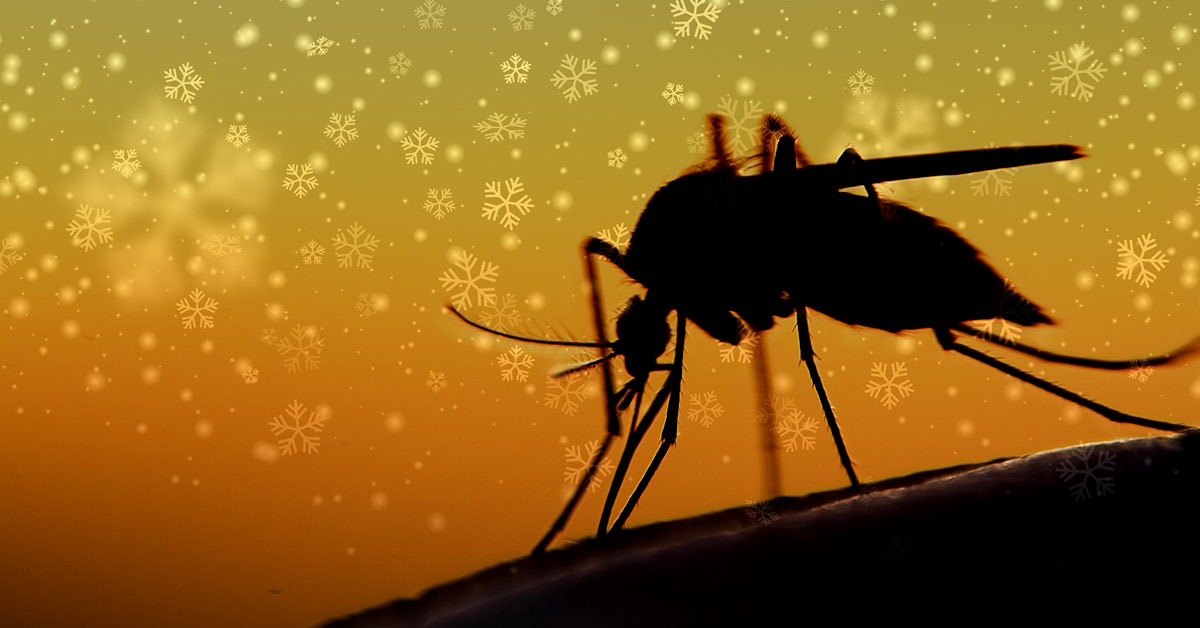There have been snow flurries, and people have hung up lights and ornaments for the winter holidays. It is December, and winter has officially begun. So why did you get bitten by a mosquito in your own home? Mosquitoes normally slow down when the weather turns cold. Still, they’re more active now, even in chilly temperatures.
Does the cold kill mosquitoes?
Yes, the cold does kill these pests, but they’ve found clever ways to survive our Southampton winters. Different mosquito species use various tactics to survive winter to help them return when spring arrives.
The main method is for females to deposit cold-resistant eggs as winter approaches. These eggs usually sit under water, getting protection from ice during the cold months. When spring warms up in Southampton, these eggs hatch and start the next mosquito generation.
The Anopheles, Culex, and Culiseta species take a different approach. After mating in autumn, females look for shelter. They find safe spots like tree cavities, underground dens, and crawl spaces. Those unexpected mosquitoes you might encounter during mild spells in mid-winter? They’re hibernating females whose rest was interrupted by a brief warm spell. When spring genuinely arrives in Southampton, these females emerge hungry and ready to reproduce.
Less common in our area, but still present, are mosquitoes that overwinter as larvae embedded in muddy areas. They usually like freshwater wetlands more than the coastal areas found in Southampton. As soon as they emerge, they hunt for blood meals to grow into adults.
Here are nine other questions we get about mosquitoes in the winter.
Where do mosquitoes go in winter?
Out in nature, a female mosquito typically hunkers down to hibernate in an old log, a crack in the ground, or another animal’s dwelling. In more urban areas, mosquito.org says they can overwinter in garages, attics, and culverts.
How do mosquitoes survive the winter?
Many don’t. In many species, the males only live for about ten days, and then they die after mating sometime in the fall. Some females enter a state of hibernation called diapause, where they fatten up in the fall and become dormant for up to six months by burrowing in rotten logs or cracks in the ground.
Before settling down for the long winter’s rest, the females will typically lay a final batch of eggs. The eggs also survive by entering a state of diapause, so their development halts until the weather warms up.
Why are there mosquitoes in winter?
Most insect species hibernate or die in winter, so why do you still see a few mosquitoes buzzing around?
It is possible that a species called Culex pipiens molestus, or the London Underground mosquito, has adapted to our urban environments. They specifically nest in sewers and subway systems and then find their way into your homes.
There have been infestations in many major cities, and according to this WNYC story, not too long ago in the Upper West Side of Manhattan. Fortunately, they aren’t known to carry the Zika virus, and it is unlikely to transmit West Nile.
Do mosquitoes bite during winter?
If it’s a warm enough winter, mosquitoes are as active as ever, but mosquitoes are scarce when deep winter rolls around.
What do mosquitoes eat in the winter?
When mosquitoes are active, they typically dine on the nectar of plants, fruit juices, and other sugary plant juices. Only the female mosquito, which drinks blood for protein and iron, develops eggs.
If a mosquito becomes trapped in a greenhouse, it would likely carry on as usual. In winter, they typically either die or hibernate until it warms up.
What temperature do mosquitoes become inactive?
Most mosquito species become inactive once temperatures are consistently below 50°F (10°C).
How long can mosquitoes live inside?
Indoor mosquitoes can live for up to 21 days. They even outlast those found outside. The real concern? If a breeding pair gets into your home or lays eggs inside, you might have mosquito issues all winter.
Can mosquitoes nest in your house in the colder months?
Absolutely. Mosquitoes can establish themselves in your home during cold months. Any eggs deposited indoors will remain viable through winter. Additionally, pregnant females may sneak in and find cooler spots to rest. They will wake up and lay eggs when the indoor temperature goes up.
How can I get rid of mosquitoes in winter?
You can do several things to prevent mosquitoes from entering your home. Firstly, check your screens to ensure there aren’t any holes that a mosquito or any other pests could enter.
Then you should check your home (inside and out) for any areas that might accumulate the standing stagnant water mosquitoes love for laying their eggs. This also goes for big, damp piles of leaves! Empty any standing water in houseplant drainage trays, and don’t let dishes sit in the sink.
A laundry room, attic, bathrooms, or anywhere that stays warm and humid is ideal for mosquitoes to breed. If you think mosquitoes are trying to spend the winter in your home, call East End Tick & Mosquito Control® for a solution.
East End Tick & Mosquito Control® Eliminates Mosquitoes
East End Tick & Mosquito Control® is Southampton’s most experienced pest control company that can take care of your mosquito infestation. Since 1997, we have provided Southampton with the most effective extermination methods.
Protect yourself and your family from disease-carrying mosquitoes and ticks this fall and winter by requesting a free estimate now by calling our office.


